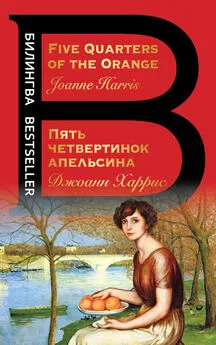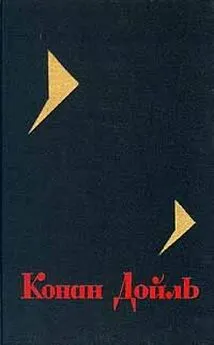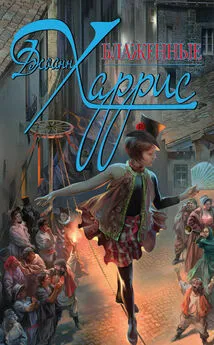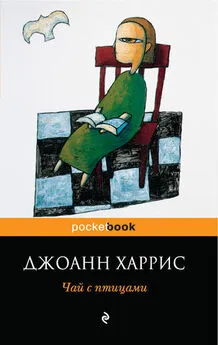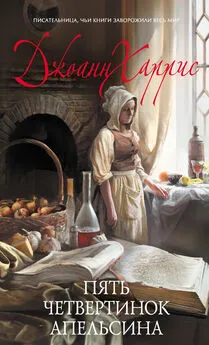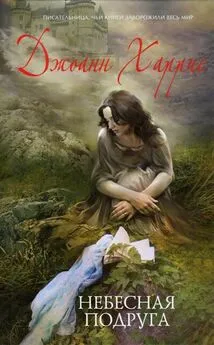Джоанн Харрис - Five Quarters of the Orange / Пять четвертинок апельсина
- Название:Five Quarters of the Orange / Пять четвертинок апельсина
- Автор:
- Жанр:
- Издательство:неизвестно
- Год:2022
- Город:Москва
- ISBN:978-5-04-163417-9
- Рейтинг:
- Избранное:Добавить в избранное
-
Отзывы:
-
Ваша оценка:
Джоанн Харрис - Five Quarters of the Orange / Пять четвертинок апельсина краткое содержание
Оригинальный текст и перевод на страницах одной книги – это эффективный способ усовершенствовать знание английского языка.
От матери в наследство Фрамбуаза получила альбом с кулинарными рецептами – негусто, если учесть, что ее брату Кассису досталась ферма, а старшей сестре Рен-Клод – винный погреб со всем содержимым. Но весь фокус в том, что на полях альбома, рядом с рецептами разных блюд и травяных снадобий, мать записывала свои мысли и признания относительно некоторых событий ее жизни – словом, вела своеобразный дневник. И в этом дневнике Фрамбуаза пытается найти ответы на мрачные загадки прошлого.
«Харрис создала многослойный сюжет, усыпанный восхитительными описаниями французских книг и раскрывающий встряхивающий эффект войны на хрупкое семейное устройство». – Publishers Weekly
«Из ее книг эта – пока самая сильная: острая, с горчинкой…» – Independent
В формате PDF A4 сохранен издательский макет.
Five Quarters of the Orange / Пять четвертинок апельсина - читать онлайн бесплатно ознакомительный отрывок
Интервал:
Закладка:
Джоанн Харрис
Five Quarters of the Orange / Пять четвертинок апельсина
Copyright © Frogspawn Limited 2001
© И. Тогоева, перевод на русский язык, 2022
© Издание на русском языке, оформление. ООО Издательство «Эксмо», 2022
Joanne Harris
Five Quarters of the Orange
Part One
The inheritance
1
When my mother died she left the farm to my brother, Cassis, the fortune in the wine cellar to my sister, Reine-Claude, and to me, the youngest, her album and a two-liter jar containing a single black Périgord truffle, large as a tennis ball, suspended in sunflower oil, that, when uncorked, still releases the rich dank perfume of the forest floor. A fairly unequal distribution of riches, but then Mother was a force of nature, bestowing her favors as she pleased, leaving no insight as to the workings of her peculiar logic.
And as Cassis always said, I was the favorite.
Not that she ever showed it when she was alive. For my mother there was never much time for indulgence, even if she’d been the type. Not with her husband killed in the war, and the farm to run alone. Far from being a comfort to her widowhood, we were a hindrance to her with our noisy games, our fights, our quarrels. If we fell ill she would care for us with reluctant tenderness, as if calculating the cost of our survival, and what love she showed took the most elementary forms: cooking pots to lick, jam pans to scrape, a handful of wild strawberries collected from the straggling border behind the vegetable patch and delivered without a smile in a twist of handkerchief. Cassis would be the man of the family. She showed even less softness toward him than to the rest of us. Reinette was already turning heads before she reached her teens, and my mother was vain enough to feel pride at the attention she received. But I was the extra mouth, no second son to expand the farm, certainly no beauty.
I was always the troublesome one, the discordant one, and after my father died I became sullen and defiant. Skinny and dark like my mother, with her long graceless hands and flat feet, her wide mouth, I must have reminded her too much of herself, for there was often a tightness at her mouth when she looked at me, a kind of stoic appraisal, of fatalism. As if she foresaw that it was I, not Cassis or Reine-Claude, who would carry her memory forward. As if she would have preferred a more fitting vessel.
Perhaps that was why she gave me the album, valueless then except for the thoughts and insights jotted in the margins alongside recipes and newspaper cuttings and herbal cures. Not a diary, precisely. There are almost no dates in the album, no precise order. Pages were inserted into it at random, loose leaves later bound together with small, obsessive stitches, some pages thin as onionskin, others cut from pieces of card trimmed to fit inside the battered leather cover. My mother marked the events of her life with recipes, dishes of her own invention or interpretations of old favorites. Food was her nostalgia, her celebration, its nurture and preparation the sole outlet for her creativity. The first page is given to my father’s death-the ribbon of his Légion d’Honneur pasted thickly to the paper beneath a blurry photograph and a neat recipe for black buckwheat pancakes-and carries a kind of gruesome humor. Under the picture my mother has penciled Remember-dig up Jerusalem artichokes. Ha! Ha! Ha! in red.
In other places she is more garrulous, but with many abbreviations and cryptic references. I recognize some of the incidents to which she refers. Others are twisted to suit the moment’s needs. Still others seem to be complete inventions, lies, impossibilities. In many places there are blocks of tiny script in a language I cannot understand. Ini tnawini inoti plainexini. Ini nacini inton inraebi inti ynani eromni. Sometimes a single word, scrawled across the top or side of the page seemingly at random. On one page, seesaw in blue ink, on another, wintergreen, rapscallion, ornament in orange crayon. On another, what might be a poem, though I never saw her open any book other than one of recipes. It reads:
This sweetness
scooped
like some bright fruit
plum peach apricot
watermelon perhaps
from myself
this sweetness
It is a whimsical touch, which surprises and troubles me. That this stony and prosaic woman should in her secret moments harbor such thoughts. For she was sealed off from us-from everyone-with such fierceness that I had thought her incapable of yielding.
I never saw her cry. She rarely smiled, and then only in the kitchen with her palette of flavors at her fingertips, talking to herself (so I thought) in the same toneless mutter, enunciating the names of herbs and spices-cinnamon, thyme, peppermint, coriander, saffron, basil, lovage-running a monotonous commentary. See the tile. Has to be the right heat. Too low, the pancake is soggy. Too high, the butter fries black, smokes, the pancake crisps. I understood later that she was trying to educate me. I listened because I saw in our kitchen seminars the one way in which I might win a little of her approval, and because every good war needs the occasional amnesty. Country recipes from her native Brittany were her favorites; the buckwheat pancakes we ate with everything, the far breton and kouign amann and galette bretonne that we sold in downriver Angers with our goat’s cheeses and our sausage and fruit.
She always meant Cassis to have the farm. But Cassis was the first to leave, casually defiant, for Paris, breaking all contact except for his signature on a card every Christmas, and when she died, thirty years on, there was nothing to interest him in a half-derelict farmhouse on the Loire. I bought it from him with my own savings, my widow money, and at a good price too, but it was a fair deal, and he was happy enough to make it then. He understood the need to keep the place in the family.
Now, of course, all that’s changed. Cassis has a son of his own. The boy married Laure Dessanges, the food writer, and they own a restaurant in Angers. Aux Délices Dessanges. I met him a few times before Cassis died. I didn’t like him. Dark and flashy, already running to fat as his father did, though still handsome and knowing it, he seemed to be everywhere at once in his eagerness to please; called me Mamie; found a chair, insisted I take the most comfortable seat; made coffee, sugared, creamed, asked after my health, flattered me on this and that till I was almost dizzy with it. Cassis, sixty-odd then and swollen with the seeds of the coronary that would kill him, looked on with barely restrained pride. My son. See what a fine man he is. What a fine, attentive nephew you have.
Cassis called him Yannick, after our father, but I liked my nephew no more for that. That’s my mother in me, the dislike of conventions, of false intimacies. I don’t like to be touched and simpered over. I don’t see why the blood we share should tie us in affection. Or the secret of spilled blood we hid for so long between us.
Oh, yes. Don’t think I forgot that business. Not for a minute I didn’t, though the others tried hard enough. Cassis scrubbing pissoirs outside his Paris bar. Reinette working as an usherette in a porno cinema in Pigalle and sniffing from man to man like a lost dog. So much for her lipstick and silk stockings. At home she’d been the harvest queen, the darling, the undisputed village beauty. In Montmartre all women look the same. Poor Reinette.
I know what you’re thinking. You wish I’d get on with the story. It’s the only story about the old days that interests you now; the only thread in this tattered flag of mine that still catches the light. You want to hear about Tomas Leibniz. To have it clear, categorized, ended. Well, it isn’t as easy as that. Like my mother’s album, there are no page numbers. No beginning, and the end is raw as the seamless edge of an unhemmed skirt. But I’m an old woman-seems here just about everything gets old so quickly; must be the air-and I have my way of going about things. Besides, there are so many things for you to understand. Why my mother did what she did. Why we hid the truth for so long. And why I’m choosing to tell my story now, to strangers, to people who believe that a life can be condensed to a two-page spread in a Sunday supplement, a couple of photographs, a paragraph, a quote from Dostoevsky. Turn the page and it’s over.
No. Not this time. They’re going to take down every word. Can’t make them print it, of course, but by God, they’ll listen. I’ll make them do it.
2
My name is Framboise Dartigen. I was born right here, in the village of Les Laveuses, not fifteen kilometers from Angers, on the Loire. I’ll be sixty-five next July, baked and yellowed by the sun like a dried apricot. I have two daughters, Pistache, married to a banker in Rennes, and Noisette, who moved to Canada in ‘85 and writes to me every six months, two grandchildren who come to stay at the farm every summer. I wear black for a husband who died twenty years ago, under whose name I returned in secret to the village of my birth to buy back my mother’s farm-long abandoned, half gutted by fire and the elements. Here I am Françoise Simon, la veuve Simon, and no one would think to connect me with the Dartigen family who left in the wake of that dreadful business. I don’t know why it had to be this farm, this village. Perhaps I’m just stubborn. That was how it was. This is where I belong. The years with Hervé seem almost a blank now, like the strange calm patches you sometimes get in a stormy sea, a moment of waiting, of forgetfulness. But I never really forgot Les Laveuses. Not for a moment. Something in me was always here.
It took more than a year to make the farmhouse habitable. I lived in the south-facing wing, where at least the roof had held, and while the workmen replaced the roofing, tile by tile, I worked in the orchard-what was left of it-pruning and shaping and dragging down great wreaths of devouring mistletoe from the trees. My mother had a passion for all fruit except oranges, which she refused to allow in the house. She named each one of us, on a seeming whim, after a fruit and a recipe-Cassis, for her thick black-currant cake, Framboise, her raspberry liqueur, and Reinette after the reine-claude greengages that grew against the south wall of the house, thick as grapes, syrupy with wasps in midsummer. At one time we had over a hundred trees (apples, pears, plums, gages, cherries, quinces), not to mention the raspberry canes and the fields of strawberries, gooseberries, currants-the fruits of which were dried, stored, made into jams and liqueurs and wonderful cartwheel tarts on pâte brisée and crème pâtissière and almond paste. My memories are flavored with their scents, their colors, their names. My mother tended them as if they were her favorite children. Smudge pots against the frost, which we fed with our own winter fuel. Barrows full of manure dug around the base every spring. And in summer, to keep the birds away, we would tie shapes cut out of silver paper onto the ends of the branches that would shiver and flick-flack in the wind, moose blowers of string drawn tightly across empty tin cans to make eerie bird-frightening sounds, windmills of colored paper that would spin wildly, so that the orchard was a carnival of baubles and shining ribbons and shrieking wires, like a Christmas party in midsummer.
And the trees all had names. Belle Yvonne, my mother would say as she passed a gnarled pear tree. Rose d’Aquitaine. Beurre du Roi Henry. Her voice at these times was soft, almost monotone. I could not tell whether she was speaking to me or to herself. Conference. Williams. Ghislaine de Penthièvre. This sweetness.
Читать дальшеИнтервал:
Закладка:
